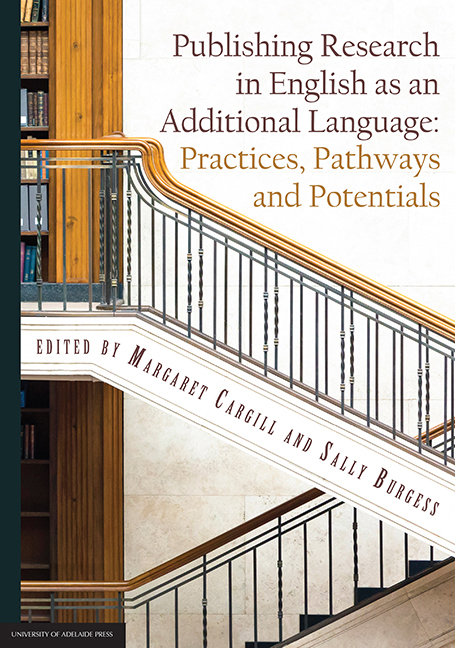Book contents
- Frontmatter
- Contents
- List of contributors
- Acknowledgements
- Foreword
- Introduction: Unpacking English for Research Publication Purposes [ERPP] and the intersecting roles of those who research, teach and edit it
- 1 Accept or contest: A life-history study of humanities scholars’ responses to research publication policies in Spain
- 2 Introducing research rigour in the social sciences: Transcultural strategies for teaching ERPP writing, research design, and resistance to epistemic erasure
- 3 Blurring the boundaries: Academic advising, authors’ editing and translation in a graduate degree program
- 4 The delicate art of commenting: Exploring different approaches to editing and their implications for the author-editor relationship
- 5 The CCC Model (Correspondence, Consistency, Correctness): How effective is it in enabling and assessing change in text-editing knowledge and skills in a blended-learning postgraduate course?
- 6 How credible are open access emerging journals? A situational analysis in the humanities
- 7 Disseminating research internationally: Intra-subdisciplinary rhetorical structure variation in immunity and allergy research articles
- 8 Scientists publishing research in English from Indonesia: Analysing outcomes of a training intervention to inform institutional action
- 9 ‘The one who is out of the ordinary shall win’: Research supervision towards publication in a Chinese hospital
- 10 The geopolitics of academic plagiarism
- 11 Training ‘clerks of the [global] empire’ for 21st-century Asia? English for Research Purposes (ERP) in Vietnam
- 12 Standardisation and its discontents
- Reflections and future directions in publishing research in English as an Additional Language: An afterword
4 - The delicate art of commenting: Exploring different approaches to editing and their implications for the author-editor relationship
Published online by Cambridge University Press: 16 March 2018
- Frontmatter
- Contents
- List of contributors
- Acknowledgements
- Foreword
- Introduction: Unpacking English for Research Publication Purposes [ERPP] and the intersecting roles of those who research, teach and edit it
- 1 Accept or contest: A life-history study of humanities scholars’ responses to research publication policies in Spain
- 2 Introducing research rigour in the social sciences: Transcultural strategies for teaching ERPP writing, research design, and resistance to epistemic erasure
- 3 Blurring the boundaries: Academic advising, authors’ editing and translation in a graduate degree program
- 4 The delicate art of commenting: Exploring different approaches to editing and their implications for the author-editor relationship
- 5 The CCC Model (Correspondence, Consistency, Correctness): How effective is it in enabling and assessing change in text-editing knowledge and skills in a blended-learning postgraduate course?
- 6 How credible are open access emerging journals? A situational analysis in the humanities
- 7 Disseminating research internationally: Intra-subdisciplinary rhetorical structure variation in immunity and allergy research articles
- 8 Scientists publishing research in English from Indonesia: Analysing outcomes of a training intervention to inform institutional action
- 9 ‘The one who is out of the ordinary shall win’: Research supervision towards publication in a Chinese hospital
- 10 The geopolitics of academic plagiarism
- 11 Training ‘clerks of the [global] empire’ for 21st-century Asia? English for Research Purposes (ERP) in Vietnam
- 12 Standardisation and its discontents
- Reflections and future directions in publishing research in English as an Additional Language: An afterword
Summary
Introduction
The premium placed on English-medium international publications for career advancement in academia has been widely documented, and this virtual English-only playing field creates a substantial burden for academics who are non-native English speakers [NNES] (Belcher, 2007; Lillis & Curry, 2010; Sheldon, 2011; Uzuner, 2008). While NNES scholars are widely published in many scientific journals and acceptance rates for these academics are similar to those of native-English-speaking authors (Benfield & Feak, 2006; Burrough-Boenisch, 2003; Ferguson, 2007; Kourilova, 1998), this success often comes at a substantial cost in terms of effort, time and other resources (Curry & Lillis, 2004; Huang, 2010; Swales, 1990; Tardy, 2004). Many scientists who wish to publish in international journals seek language support for their manuscripts, although the availability of these services can vary substantially depending on the researcher's location, network of international researchers available to assist them, availability of funds, and other factors. Assistance can come from individuals in researchers’ personal or professional environments, and the background and experience of these facilitators may vary widely (Burrough-Boenisch, 2003; Lillis & Curry, 2010; Shashok, 2001).
Professional language support provided to NNES researchers who have access to such services may come in a variety of forms. While some authors have their manuscripts translated into English from their mother tongue, others call on collaborators to improve texts already drafted in English. This type of work has been described using a number of terms, including revising, proofreading and editing, with each term subject to a range of interpretations. For the sake of simplicity, we will refer to the process of improving written work as editing, and its practitioners as editors.
Factors influencing approach and orientation in editing
When presented with English language research papers, editors may take any one of a number of approaches that reflect the many constraints inherent to the author, the editor, the context of their collaboration, the type and quality of the original draft, and the explicit and perceived relationship between the two. Some institutions hire inhouse editors to support staff researchers in their attempts to publish their papers. These institutional editors may be found in a number of private and public organisations, including universities, hospitals, research institutes, national and international agencies, and a range of enterprises.
- Type
- Chapter
- Information
- Publishing Research in English as an Additional LanguagePractices, Pathways and Potentials, pp. 71 - 86Publisher: The University of Adelaide PressPrint publication year: 2017

